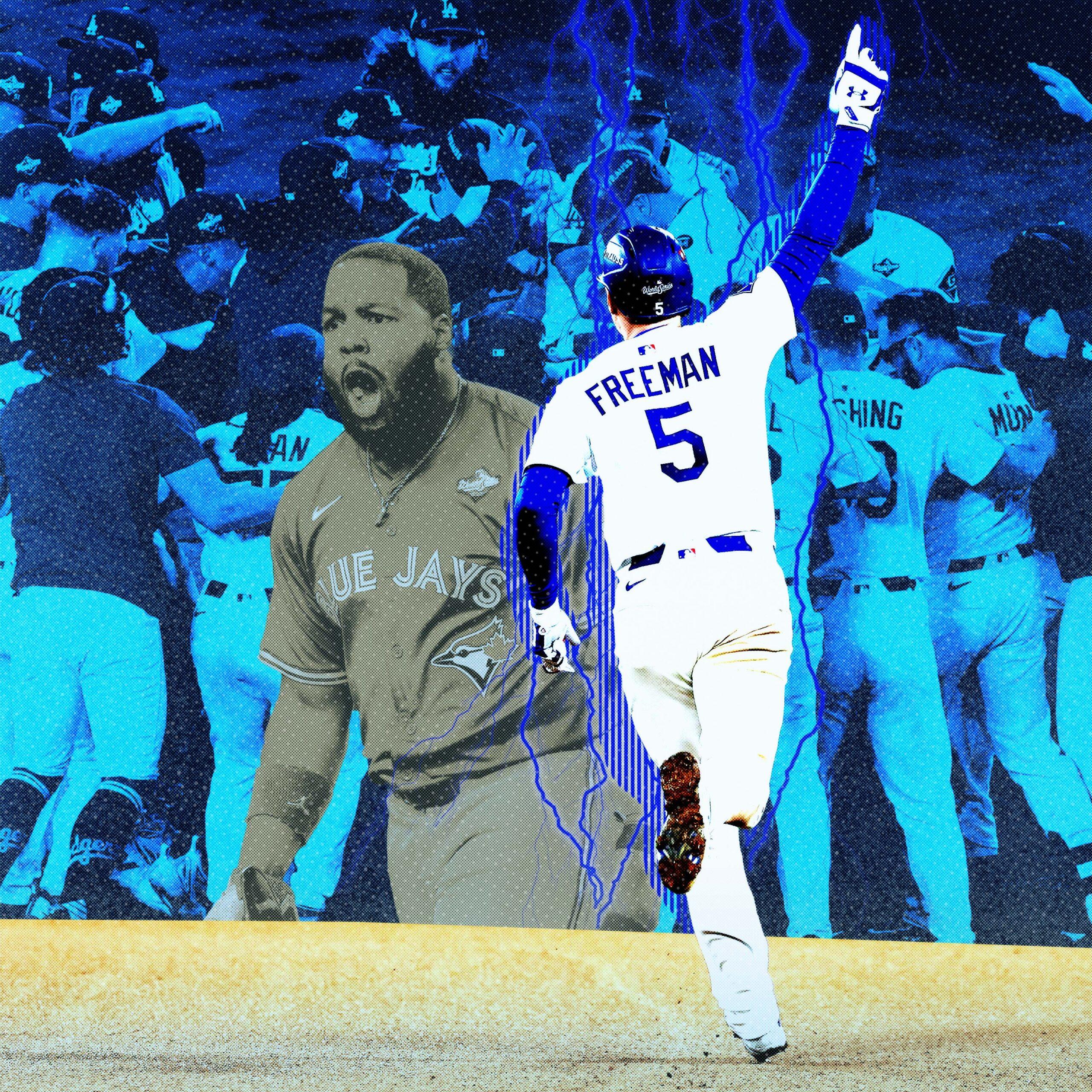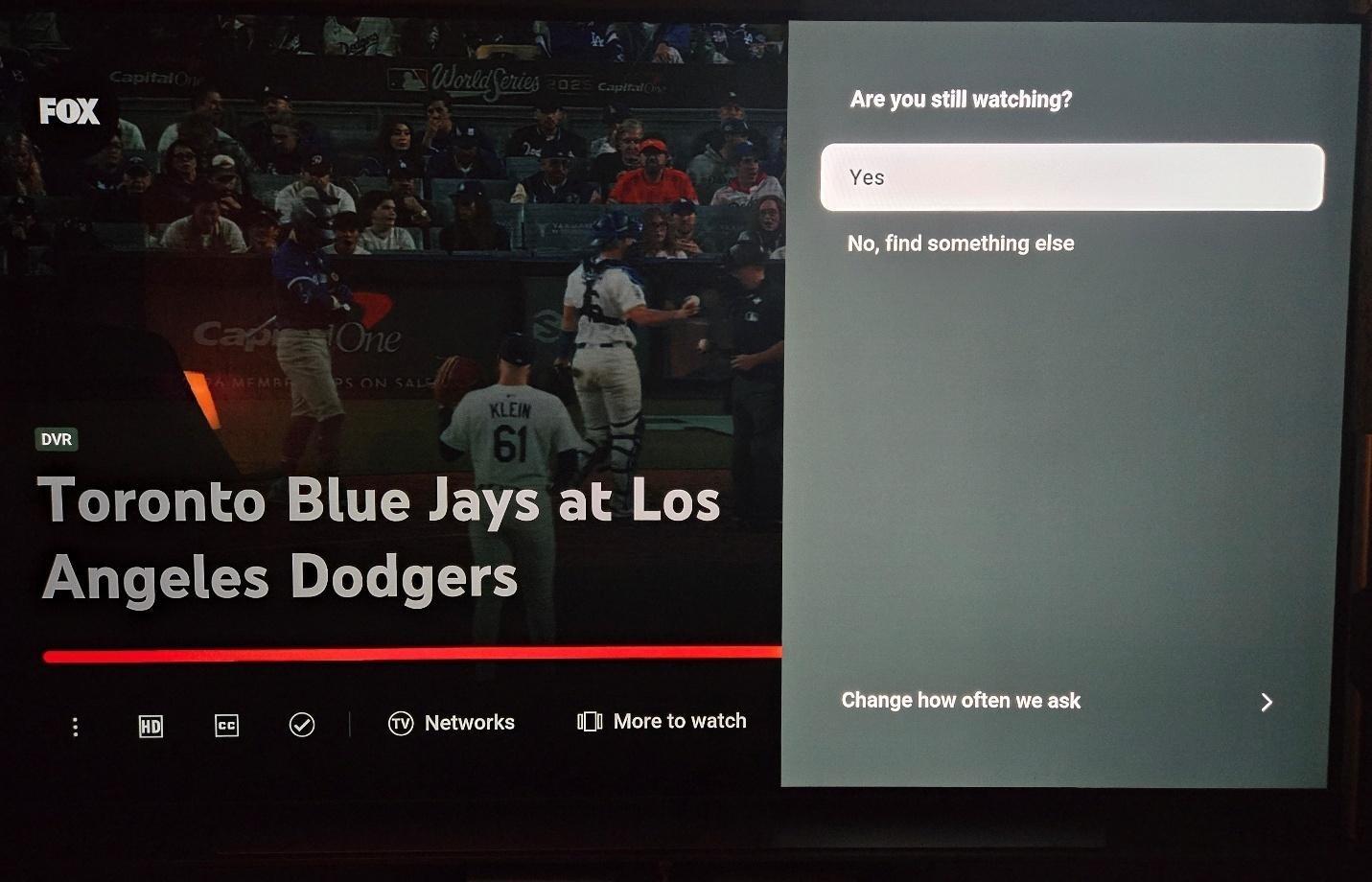
The powers that be have tried to make baseball behave. They have strictly restricted the time between pitches. They have tampered with once-sacrosanct rules to ensure that extra innings aren’t too extra. They have made the sport more predictable, more pliable, more presentable, more marketable. For much of the year, they have made major league games into activities it’s possible to plan around. In pursuit of popularity and profit, they have tried to break baseball like a bucking bronco. They have tried to make it conform. But baseball is incorrigible, and it will not be bound.
On Monday—and in most American time zones, part of Tuesday, too—baseball disobeyed. The game’s inner gremlins emerged, boarded unmuffled motorbikes, and popped wheelies on an immaculately manicured field. Executives, broadcasters, and umpires planned, and baseball laughed and lengthened. The timekeepers can start the clock after each pitch, each plate appearance, and each inning—but, as October baseball rebelliously insists, they can’t control how many pitches, plate appearances, and innings there are. All they can do is watch and wait like the rest of us as those counts increase. The game keeps its own counsel and maintains its own time, measured only in outs. And outs, in theory, are infinite.
In practice, outs always run out. Each game of baseball lurches and lumbers toward a finish line whose location can shift without warning, but eventually, that destination nears. On Monday in Los Angeles, the end came when the Dodgers’ Freddie Freeman drove a pitch by the Blue Jays’ Brendon Little over the fence in dead center. Freeman, who decided Game 1 last year with a 10th-inning slam, became the first player with multiple walk-off homers in his World Series career. He hit this one on the 609th pitch, in the 153rd plate appearance, in the 18th inning, just before midnight in Chavez Ravine. If you were watching in Toronto, the line score says you were up all night—if not because the game literally lasted so long, then because the adrenaline, coupled with the sting of the 6-5 defeat and resulting 2-1 series deficit, made it difficult to sleep after Freeman’s blow.
By innings total, Game 3 is tied for the longest Fall Classic contest (and postseason game, period) with a previous Game 3, also played in L.A. and won by the Dodgers almost exactly seven years earlier. Max Muncy, who started both of those games for the Dodgers, ended the first one with a walk-off homer of his own. Before that tater, the Red Sox had persisted for seven hours and 20 minutes, despite “only” 561 pitches being thrown over 131 PA. This year’s comparatively action-packed Game 3 lasted a mere six hours and 39 minutes, without a single performance by the Jonas Brothers to pad out that time. Trimming 40 minutes from the madness was this year’s lone concession to the clock.
A great game isn’t always a well-played one. (And well-played ones aren’t always great.) This one tended toward disorder. There were so many mistakes, by so many participants. The two teams combined to go 4-for-26 with runners in scoring position and to leave 37 runners on base. They ran (or walked) into outs or gave them away on their managers’ orders. Umps and broadcasters blew different kinds of calls; contrary to commentator John Smoltz’s mid-broadcast claims about batters’ proclivity to lift the ball as they swing for the fences, the percentage of postseason (or, for that matter, regular-season) batted balls classified as flies or pop-ups has been no higher in extras than during regulation. In the top of the 18th, Fox cut to third base instead of first on a back-pick attempt; maybe the director and/or camera crew were tired, too.
When does a debit due to a bad baserunning decision become a credit on a pitch-perfect throw? When does an offensive failure to drive in a run become a defensive triumph that stops the same run from scoring? Some plays can be both, and a few of Game 3’s highlights were so exquisite precisely because they took two players to create: one to make a mistake and a second to capitalize on it. Both teams threw runners out at home plate: Addison Barger erased Freeman with a laser in the third …
… and Teoscar Hernández and Tommy Edman (both of whom made costly misplays on the field elsewhere in the game) cut down Davis Schneider to preserve the tie in the 10th.
Vladimir Guerrero Jr. ran hard and threw hard. Alejandro Kirk, who homered in the fourth, made a glorious throw in the ninth to stop Shohei Ohtani from stealing second:
Losing contact with that bag was the only knock against Ohtani on a night when he homered twice, doubled twice, and drew five walks, four of them intentional and one quasi-intentional. His no-out performance at the plate set numerous postseason records, and he tied the record for reaching base in any single game. Given the way Jays manager John Schneider handled Ohtani later in the game—and subsequently indicated that he’d continue to handle him in in Game 4 and beyond—he’d probably like to take back the decision to let Seranthony Domínguez face him (and throw him a meatball that begot a game-tying homer) in the seventh. Then again, the Jays might not have had a lead if Dodgers manager Dave Roberts hadn’t stubbornly brought out the borderline unusable Blake Treinen, who had yielded the go-ahead run to Toronto in the top of that frame.
Roberts risked making another familiar mistake five innings later, when he engineered the latest in a long line of perilous postseason moments for Clayton Kershaw. This time, it worked, albeit barely. The retiring southpaw, who’s been both one of the best regular-season pitchers ever and one of the worst playoff pitchers ever relative to his typical performance, provided a possible capper to his career by entering in relief of Emmet Sheehan with two outs and the bases full. Kershaw, throwing age-adjusted gas, ran the count full before getting Nathan Lukes, who was stuck in “protect” mode, to swing at three straight probable balls, the last of which led to an inning-ending groundout. If that’s the last we see of Kershaw before he enters his Sandy Koufax–esque ace emeritus phase, it was a wonderful way to go out. (But let’s be real; if the Dodgers have a large lead in a potential clincher, he’ll be back on the mound.)
In the playoffs, fans experience a sine wave of anxiety that intensifies or diminishes between half innings, as their heart rates rise and fall in proximity to potential defeat. When their team is batting, they can’t lose a lead or fall further behind, which offers a brief reprieve. But when their opponent takes a turn at the plate, every pitch is a round of Russian roulette. Extra-inning games make even nonfans feel that ebb and flow, as each fruitless top half sets the stage for a sudden-death bottom half. Somehow, two teams plagued by bad bullpens extended that sweet torture by posting 10 1/2 consecutive scoreless innings after Ohtani’s second dong, as the clubs combined to use a postseason-record 19 pitchers.
By the 15th inning, even Rob Lowe was looking his age. By the 16th, Fox commentators Joe Davis and John Smoltz were salivating over a selection of fruits in Toronto’s dugout. By the 17th, YouTube TV had decided that the game couldn’t possibly still be going. It kicked me out and made me miss a few pitches while I frantically searched for Fox and turned on what was listed as the local news.

By the 18th, a fruit tray was delivered to the broadcast booth, and Davis and Smoltz were sated. So were the watchers at home, more or less, and the two teams were spent. Both the Blue Jays and Dodgers had emptied their pens, and some pitchers had emptied their energy reserves. The Dodgers’ rookie righty Will Klein, whose previous single-outing highs were two innings and 36 pitches, played the part of Nathan Eovaldi in 2018’s Game 3 and doubled those totals, pushing himself to four innings and 72 pitches. (Eovaldi was the hard-luck loser, whereas Klein recorded the win.) A game that involved several starters pitching in relief—Eric Lauer, who threw 4 2/3 scoreless after entering in the 12th, led the Blue Jays in championship WPA—almost featured two more. By the end, scheduled Game 4 starter Shane Bieber was stretching for Toronto, while in the Dodgers’ pen, Yoshinobu Yamamoto was warmed up, fresh off a second consecutive complete game on Saturday (but not feeling fresh, surely).
Courtesy of Klein and the pitcher who preceded him, Edgardo Henriquez, there were more pitches thrown 98 or more miles per hour from the 13th inning on (37) than there were in the entire 2008, 2009, 2010, and 2012 World Series combined (26). Klein, Henriquez, and Justin Wrobleski, who totaled 6 2/3 scoreless innings on Monday, had recorded zero outs this postseason before Game 3. If Roberts was paying attention, Treinen should be buried on the bullpen depth chart behind that underused trio (assuming that Klein recovers from his epic outing), Jack Dreyer, Sheehan, and, of course, Roki Sasaki, who earned five big outs himself. (One of them at the expense of Myles Straw, whom the Jays acquired in January as part of their own effort to sign Sasaki.)
That intel could redound to the Dodgers’ benefit, and an injury to George Springer’s right side could hurt Toronto, too. Even aside from those factors, a tiebreaking Game 3 is pretty pivotal, and the projections and probabilities now favor the Dodgers even more than they did to begin with.
In some respects, and for both better and worse, Major League Baseball has legislated some of the sport’s historical strangeness out of existence: the lobbing of intentional balls, the Waxahachie Swap, extreme defensive shifts, pretending pitchers could hit, and yes, extra-inning endurance tests that leave players and spectators to suffer sports hangovers the next day. But even today, at times, baseball can be blissfully weird: an improbably deep double play here, a preposterously shallow one there, and a game that goes so far off script that it lasts twice as long as intended.
Charmingly, baseball is most liable to let its freak flag fly when the most eyes are on it. And in the late innings, as the fly-ball-distance-suppressing marine layer settled over Chavez Ravine, Game 3 seemed reluctant to end. Will Smith led off the 14th with a ball to the wall that he and the denizens of Dodger Stadium thought, for an instant, would send them home. Moments later, Muncy crushed a loud foul that had home run distance. In the 16th, Hernández, who had homered in the second, threatened to do it again. And before he broke through, Freeman gave one ball a ride in the 13th, then launched a ball in the 15th that looked off the bat like it could be a walk-off double.
All of those batted balls topped triple-digit exit speeds. And all of them were corralled by some combination of bad timing, the environment, and Daulton Varsho. In the 18th, Freeman finally went yard. And as his homer soared out to center, a kind of competitive gravity took hold of Game 3 and pulled it down to earth, like the White Witch’s forces felling Aslan in the animated TV version of The Lion, the Witch and the Wardrobe. All men (and magic lions) must die, and all great games must end, even those that flirt with eternity. But Aslan returned, and on Tuesday, so will L.A. and Toronto, too quickly for their comfort. For fans who are dragging today, there’s no better treatment than downing some hair of the dog in Game 4.
Not that the thrill of a doubleheader-length classic will wear off anytime soon. Game 3 was almost a series unto itself. I watched the delirious last several innings with a giddy grin on my face, my inner child up past his bedtime. This baseball was broken and beautiful, messy and magnificent, the kind the line “I don't care if I never get back” was about. I wouldn’t want it to be like that every day, but I welcome such stalemates once every seven years, or twice every 120. I’m not such a sicko that I’m immune to creature concerns: Of course I wanted someone to win so that I could turn off the TV and eat, write, and sleep. Almost as much as I wanted to see Yamamoto pitch the 19th, Ohtani reach for a 10th time, and a few more flies freeze at the warning track, refusing to release us from baseball’s spooky-season spell.

